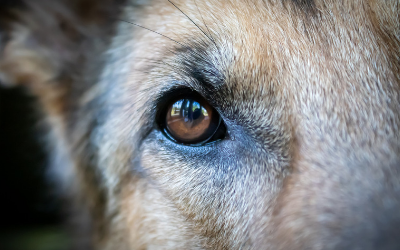What Senses Do Animals Use To Detect Health Issues
Practise pets have a sixth sense?
Humans have five recognized senses. We gustatory modality, touch, smell, come across, and hear. Besides, dogs have the same v senses. But some people think that dogs are one up on us. Do you think dogs really take a sixth sense?
Canine Senses 
Although dogs and humans have the same five documented senses, they aren't all exactly alike. When it comes to vision, humans accept more color detecting cells (cones) in the eye which allow u.s. to discern a broader color spectrum. Cones also allow us to discern more visual detail.
Dogs have a few visual advantages of their own. Dogs see better in the night than humans. Canines have larger pupils that let in more light. Canine eyes also have more light sensitive cells (rods) in the middle of the retina. Both of these adaptations mean better vision in dim light. In addition, the canine eye detects tiny movements that may elude us. The canine sense of sight makes them good hunters, especially at night.
When considering the sense of smell, dogs win past a nose! Their noses office nearly 10,000 times better than ours practise. Simply the sensory contest isn't over! Our sense of taste beats theirs. Humans have about 9000 taste buds as compared to near 1700 in the dog. Think about that the adjacent time you order a yummy dessert!
Let's phone call information technology a tie between human and canine regarding touch. Hearing is comparable, likewise, equally far as quality of audio. Merely dogs can detect much higher frequencies and can hear at much longer distances than we can.
What is a sixth sense?
Like humans, dogs have v remarkably practiced senses, but practice they accept an elusive sixth sense? What is a sixth sense, anyhow? Can information technology really be defined?
Think of a sixth sense every bit intuition or a "gut feeling". The v recognized senses each give united states of america a fragment of information almost our environment or circumstances. A sixth sense draws from the cumulative data gathered by the other 5 senses to increase the level of awareness. Is it an additional sense or a heightened appreciation of the other v senses? Who knows? Regardless of your opinion, anecdotes involving the "sixth sense" are quite interesting.
Sensitive Examples 
Human mood. Many pet owners note that dogs are quite intuitive. When we are happy, our dogs may be equally exuberant. Ever come up home excited after winning a tennis lucifer or getting a task promotion and sentry your canis familiaris jump around excitedly? When we are sad, our dogs endeavor to comfort us. Always sit down on the sofa in serious contemplation and have your pooch nestle abreast you? Humans produce a group of "feel good" hormones such as oxytocin, serotonin, and dopamine. The levels of these hormones increase and subtract along with the elevation or depression of our moods. When we are ill, our dogs may detect a fall in hormone levels and answer accordingly. As they comfort u.s., hormone levels may ascent and we feel ameliorate. How rewarding for our dogs when they detect this ascent and realize that their presence helped united states of america feel better! Our furry friends seem to know what we need. But how? Is it our facial expressions or our vocalisation or our body linguistic communication or our hormones or our smell? Or is it a 6th sense?
Hearing and smelling. Dogs have an astute sense of hearing, then they hear distant thunder before we do. They as well scent changes in the atmosphere (ozone) better than we practice, then they may sense an oncoming storm. E'er watch your dog anxiously pace through the house before a storm hits? Dogs take too been known to notice changes in seismic activeness and feel infinitesimal motility earlier earthquakes occur. In improver to hearing, smelling, and feeling weather activity, dogs tin can discover changes in barometric pressure level or electromagnetic fields. According to an Associated Printing poll, 2/iii of pet owners call up their pets have a sixth sense about atmospheric condition. Who needs a weather condition forecaster when you lot have a dog?
Homo illness. The domestic dog's slap-up sense of odor enables them to "sense" some human illnesses. When we are ill, our body chemistry changes causing the emission of certain aromas. Human noses may non observe these subtle changes, but a canis familiaris's nose may. Capitalizing on this splendid sense of smell, dogs can be trained to detect specific volatile organic compounds (VOC) in humans that reflect ongoing illness. VOC'southward are chemicals emitted by humans that exist in both gaseous and liquid states. Past sensing VOC's, dogs may assistance in the early detection of lung cancer by smelling a person's breath or bladder cancer past smelling their urine. The canine-VOC connection may eventually lead to advances in cancer diagnosis as researchers work to isolate the protein or chemical that alerts the dog. Dogs can also predict low blood carbohydrate by detecting VOC's emitted through the skin pores of a diabetic or predict a seizure by recognizing changes in VOC's, pupil size, and demeanor in a patient with epilepsy. A service canis familiaris that is familiar with their owners "norm" tin can exist especially accurate at discerning minor changes that can betoken a alter in health status. When coupled with their ability to read their owner'southward mood, service dogs are quite skillful at predicting health problems and preventing injury. 6th sense or super hero?
Daily activities. Dogs acquire the routines of the people who live with them. They know when we are going to wake up, go out for piece of work, and return dwelling. Dogs sort of accept an internal clock. Ever have your canis familiaris meet y'all at the front end door when y'all go far home from work? Maybe he simply knows your schedule. But maybe it's more. Ever have your canis familiaris waiting at the door when you come home unexpectedly? Y'all're not alone! In i study, hidden cameras were placed in homes where researchers had owners come domicile at random times. Despite the change in schedule, the dogs somehow knew when to go to the door to greet them. Did their acute sense of hearing and smell detect their possessor'southward presence or did their sixth sense kicking in?
How can you sense your pet'south 6th sense?
Nosotros may non exist as sensitive equally our dogs, simply even mere mortals can recognize when a dog's sixth sense is on the task. Service dogs will respond, as trained, when their owner becomes sick. They will alarm a person with epilepsy to an impending seizure or a person with diabetes to a drop in claret carbohydrate and assist them avoid injury past vocalizing or nudging them to sit down or pull the car to the side of the route. These responses utilize innate ability and professional preparation. Simply allow'southward not ignore the untrained responses of our amateur pet dogs. Dogs that detect oncoming bad weather may pace nervously and whine. They may hide. They may bark. They may seek out their owners. Dogs that notice changes in their owner's mood may cuddle up next to them or beg to exist petted. Dogs that notice illness may lick the owners endlessly and stay closely by their side. These responses may not be trained, simply they are significant.
You know your pet and he knows you. Just pay attention to him and you may be surprised at how intuitive he is. And even though in that location is no scientific evidence regarding a dog's sixth sense, we certainly accept "sense" plenty to appreciate our dogs' abilities and how they integrate their other five senses in an amazing mode.
Source: https://vcahospitals.com/know-your-pet/do-pets-have-a-sixth-sense
Posted by: nishimuranaturawrove.blogspot.com

0 Response to "What Senses Do Animals Use To Detect Health Issues"
Post a Comment